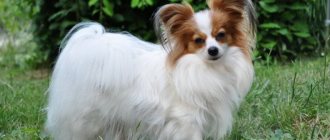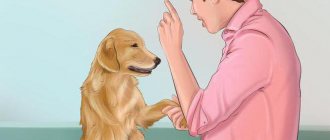When all the doubts about whether to have a four-legged friend or not are left behind, the only question arises - how to choose a puppy?
This is a difficult task, but if you approach it responsibly and adhere to certain rules, then soon a new family member will appear in your home - everyone’s favorite and faithful companion - a little puppy. The process of choosing a puppy can be divided into four stages.
Breed selection
According to the International Canine Association, today there are more than four hundred dog breeds in the world, the number of which is increasing every year. Different breeds differ not only in appearance and size, but also in character.
If you know exactly what breed of dog you want to get, then you are in luck. Do not doubt your choice and you can safely skip this stage.
For a future owner who has not yet decided on this issue, the task can become one of the most difficult. But don't panic! Let's figure out together which puppy to choose and what breed it should be?
First of all, you need to decide for what purpose you are getting a pet. There may be several options:
- You are looking for a true friend for yourself and your family. Then consider dog breeds that are friendly to people and calm with children. They should be flexible, but at the same time active, who love to play and spend time actively. It could be a Labrador, collie or miniature schnauzer.
- You need a reliable guard and a good companion. Such dogs are loyal and independent, always wary of strangers. In most cases, these are large animals, they are very trainable and are ready to serve their owner until the end of their days. Prominent representatives of guard dogs are Caucasian and German shepherds, Rottweilers, and Dobermans.
- You are looking for an assistant in the person of a four-legged friend who will accompany you during hunting and travel. Hunting dogs are not used to sitting within four walls; they definitely need freedom and regular trips into nature. The spirit of adventure is in their blood! If your interests coincide and you want to get such a dog with the goal of using its natural instincts for their intended purpose, then pay attention to spaniels and greyhounds.
- You need a show dog with whom you can participate in championships and win awards. Absolutely any breed that is recognized by the World Canine Federation is suitable to participate in such events. A pedigree, a veterinary passport of the pet with all marks and a certificate of health of the dog are required. Therefore, the main thing here is not the breed of the puppy, but the genes and pedigree of the parents.
If the breed of your future pet does not matter to you, then you can consider purchasing a mongrel dog.
In this case there are some risks:
- until the puppy grows up, its dimensions and what external characteristics it will have remain unknown (since mixing different breeds gives unpredictable results);
- the character, behavior and habits of a mongrel puppy are difficult to predict;
- if the animal was taken from the street, it is necessary to visit a veterinarian and rule out diseases dangerous to others. If necessary, you need to get vaccinations and prophylaxis against parasites.
But besides the risks, these animals have their positive sides:
- non-purebred dogs have better health than their purebred relatives;
- mongrels are easier to train and become very loyal to their owner.
Be that as it may, you need to choose an animal first of all, listening to your inner voice. Even if this is a non-purebred dog, if you have established contact and complete mutual understanding with it, it means that you should pay attention to this animal and take time to make a decision.
Will be useful: Puppy or adult dog
Reasons for a dog's possible aggressiveness
When assessing the temperament of an animal, it is important to understand that there are no bad or good ones. There are dogs whose behavior is not suitable for the owner. Thus, a small puppy with aggressive tendencies is absolutely not suitable as a pet for a family with small children. But on the other hand, it is an indispensable assistant in protecting your home or car.
Scientists from various scientific institutions have become interested in the question of why dogs can be aggressive towards family members. Solving a similar issue with the help of breed is not correct , because both dogs of large breeds and small decorative dogs can be vicious. To obtain the results, an experiment was conducted in which several hundred dogs - purebred and outbred, over 1 year of age - took part.
The results obtained were stunning - after all, aggression is determined not by breed, but by the behavior of the owners in society and the family in particular.
The main causes of aggression in dogs are:
- The owner's first animal - when buying a puppy, a person does not think about the correct handling of the animal.
- Lack of training - by teaching the animal new commands, a person shows his importance to the dog and maintains leadership qualities in the pack.
- Complete absence of punishment - any puppy should be punished, especially when it starts to bare its teeth. It is worth emphasizing that beating an animal is not at all necessary. You can scold an animal in a stern and calm tone, because sometimes such treatment is quite enough.
- Buying an animal for temporary entertainment. In most cases, puppies bought as gifts cease to be liked by their owners after the first pranks. Constant punishment and lack of attention lead to aggression in the dog.
- Lack of proper attention to the animal - walking, talking and playing with the pet leads to greater understanding. The authority of the head of the family in the eyes of the animal reduces the risk of the pet developing aggressiveness.
Gender selection
After the stage of choosing the breed of the puppy, you will need to decide on the gender of the future pet. If you fundamentally want to have only a male or female for the purpose of further breeding, then the issue is resolved for you.
For those who are still choosing the gender of the puppy, the following information will be useful. Usually, males and females have some differences in character and appearance.
Features of males:
- usually look larger than females, more powerful and muscular;
- have a strong nervous system, therefore they are more resilient than individuals of the opposite sex;
- due to their physiological characteristics, they are able to work all year round, unlike bitches who are less productive during the period of heat.
Disadvantages of male dogs:
- have a more aggressive and dominant character in relation to relatives and the owner. If you do not pay due attention to training in time, they can become uncontrollable;
- less attached to the owner than bitches;
- in the presence of “girls” they behave uncontrollably. They can drop everything when they hear the smell of a leaking bitch. Therefore, when going for a walk with a dog, you must take a collar and leash with you;
- have a need to mark their territory wherever they are. Thus, walking with a male dog takes longer than with a dog of the opposite sex.
IMPORTANT! When the puppy grows up and begins to show attention to “girls”, you need to decide: will you seriously engage in breeding offspring or not? If the answer is negative, it is better to castrate the male dog, which will help to avoid problems with the dog’s behavior in the future. It will also significantly reduce the risk of cancer in your dog.
Features of bitches:
- usually have smaller sizes than males, look smaller and squat;
- more attached to the owner and home;
- have a soft, flexible character and are easy to train;
- They have high intelligence, unlike male dogs, who are more emotional.
Disadvantages of bitches:
- not as hardy as males;
- bitches go into heat several times a year. During this period, the dog becomes less efficient and may not obey the owner;
- during an accidental mating, she can become pregnant and bring unwanted puppies into the house;
- During pregnancy and nursing puppies, she becomes less active and unfit for service.
For breeding dogs, it is better to take a female dog, because raising an “extra-class” male is very difficult.
IMPORTANT ! If you do not intend to use the bitch for breeding, it is better to sterilize her to avoid health problems.
Having become familiar with the characteristics and disadvantages of both sexes, it will be easier for you to make a choice in favor of one or the other.
The connection between the black mouth and the character of the animal
There is an opinion that the presence of a black palate in a dog means that the pet is obligatory aggressive. Scientists involved in genetic research claim that the connection between temperament and the content of the pigment, melanin, is very strong.
The presence of a large amount of pigment in the four-legged friend is manifested in the coloring of the sky black, and there are also dark circles around the eyes, a strong and powerful frame - such a dog tends to take over and dominate. Such a pet will resist and prove its point to the last, sometimes using its teeth and claws. In addition, the gene responsible for the production of melanin is closely related to the dominance gene in four-legged pets.
But do not forget that this is only theoretical knowledge and it does not have a 100% guarantee. It is impossible to determine that a dog will be angry based on the sky.
Opponents of the first theory argue that a black mouth is not a sign that the dog will necessarily be angry and aggressive. The black color of the palate is nothing more than strong pigmentation of the oral mucosa. Similar pigmentation disorders are observed in people during pregnancy or old age. This is a consequence of a disruption in the hormonal system and is not a sign of aggression.
A black mouth is a guarantee of healthy teeth in a dog. In such animals, the enamel on the teeth is much stronger than in their relatives, and the teeth themselves are practically not subject to the destructive effects of caries.
It must be remembered that calm and self-possessed dogs are not suitable for law enforcement work, but are excellent companions for older people. Dogs that score 1 point in tests are warriors and will definitely show their dominance.
Submissive dogs recognize a person as their leader, and there is no particular need to control such a dog. In order for such a dog to carry out a command, it is enough not to order, but only to ask. However, submissive dogs are by no means phlegmatic by nature and are excellent protectors, companions and favorites of the entire family.
It is very important to consider not what breed a dog should be in order to be less aggressive, but how a person will treat it.
What attitude will the whole family have towards the dog? You can often hear the phrase “Dogs are the mirror of man.” Pets begin to resemble their owners and unloved animals, without attention and affection, become aggressive and angry.
Where to get puppies
When you make a decision about where to choose a puppy, it is worth considering whether it will be purebred or not purebred.
It will be interesting: Are you ready to buy a puppy?
Outbred puppies
If you take the liberty of having a mongrel baby, you can go to a shelter, a flea market, or pick up a puppy.
In all these cases, caution is required. Before taking your pet home, take a look at what conditions it was in all this time, how it was treated, and what it was fed. Find out his story, what he had to go through before meeting you. Then you will better learn to understand the puppy and the adaptation process will be easier and faster.
If possible, visit the animal for a while and observe its habits and reactions. Let him get used to you.
Usually there is a veterinary clinic at shelters, where you should be given a report on the dog’s health condition. If you purchase a puppy at a flea market or secondhand, a visit to the veterinarian will be necessary.
Pedigree puppies
Naturally, when buying a purebred puppy, our expectations must be justified and the dog must fully comply with the breed standards!
To do this, you need to contact experienced breeders or a nursery. It is better if these are people who breed only one breed of dog, to which they devote all their attention.
When buying a puppy from a breeder or a kennel, you can be sure that the dog is purebred, healthy, and has all the vaccinations according to its age. Also, she has a passport and pedigree. If you are denied any of the above documents, you have the right to demand them or refuse the services of this breeder.
Also, when visiting the nursery, pay attention to the appearance of the room in which the puppies were born. Are there any foreign odors there, is it clean? What does the entire nursery area look like? Remember - it is impossible to raise healthy offspring in poor conditions!
If anything confuses you, do not hesitate to ask questions. Find out more about the parents of your future pet. Most likely, they will be in the nursery and you will be able to get to know them and observe their character and behavior.
In any case, no one can be 100% insured against surprises! And it is also impossible to completely guarantee that the puppy will grow up with the character you dreamed of. Once the baby is in your home, all responsibility for his upbringing falls on you.
Backward-pointing ears
If your dog keeps his ears turned back, his head bowed down, and his mouth remains tightly clenched, this may indicate that the animal is unhappy. Body language is the only way dogs can communicate with their owners. If you pay attention to such details, you will learn a lot about your pet's emotions. To deal with negativity, try simply scratching your dog's belly or the area behind the ears. Most likely, your pet will forget everything you upset him with in just a few minutes if you show affection and care.
How to choose a puppy?
Having decided on the breed, gender and breeder from whom you decided to purchase a puppy, you need to proceed to the most important stage - assessing and choosing your future pet.
The following tips will help you with this:
- Ask about the number of puppies in the litter.
For strong and healthy offspring, a bitch should have no more than 7 puppies. In this case, they fully feed and develop, while receiving a sufficient amount of milk.
If there are more puppies in the litter, they may lag behind in development and grow more slowly. Even with artificial supplementary feeding, babies cannot receive all the beneficial substances that they acquire with mother's milk.
A small number of puppies should also be alarming. If a bitch has only one or two puppies, then the rest could be born dead or die in the first days of life from some disease. In this case, ask the breeder for detailed explanations. If you doubt this litter, it is better to refuse the purchase.
Even if you have chosen the most active and largest puppy, examine all his brothers and sisters. Do they have any abnormalities or physical disabilities? If you don’t find any, this indicates good genetics of the litter, and therefore of your future four-legged friend.
Now you know how to choose a puppy from a litter and can handle this task yourself.
- Examine the puppy carefully
We proceed to the most important stage - examining the baby.
Carefully study the breed standards in advance, especially those requirements that apply to puppies. Thanks to this, you will know how to choose a healthy puppy of the appropriate breed.
Ask the breeder to select puppies from the litter of a certain sex (if this is important to you) and you can begin the examination.
Pay attention to:
- the number of teeth and bite of the dog (must meet the standards of the breed you have chosen);
- The puppy’s coat should be shiny, the skin clean, without peeling or “crusts”;
- the stomach is soft and elastic. If you find that the belly is hard or swollen, then it is better to choose another dog, since the puppy may have problems with digestion, and therefore with health in general;
- completely feel the puppy - rule out the presence of any neoplasms or hernias on the pet’s body;
- the dog’s nose should be shiny and wet, the eyes and ears should be free of discharge, the tail (if not docked) should be free of kinks and damage;
- The puppy must stand well on its feet and maintain balance. Examine the front and hind legs to rule out any possible injuries or congenital deformities;
- check the baby’s hearing - it should respond to the source of sound, so knock with some object on the wall or drop the keys on the floor;
- If you are going to get a show dog, then put it in a stand. Give preference to more seasoned puppies that behave calmly in this position. If the dog is healthy and correctly built, then it is initially easy and comfortable for him to be in the stand;
- puppies must be vaccinated (according to age) and have a veterinary passport.
- Watch the puppy.
If you have the opportunity, be sure to observe the puppy’s behavior for several hours (or better yet, a whole day).
Pay attention to how the dog behaves with other littermates: it is aloof or actively plays with them. Or maybe the dog behaves aggressively and starts fights? Take this into account when making your choice.
If during observation you find that the puppy is passive, sleeps all the time, does not respond to extraneous sounds, and does not eat well, then most likely he is sick. A healthy dog should be active.
Spend some time alone with the puppy, make sure that the baby is not afraid of people and is friendly towards you. Play with him, see if the puppy makes contact.
If your acquaintance was successful, the dog is healthy and active, then you can safely make a choice in favor of the puppy you like!
Licking when there is no food
If a dog constantly licks its nose, but there is no food nearby, it may be due to mental stress or dissatisfaction. For example, this is how animals begin to behave if they are hugged by children or strangers. Dogs don't like this type of touching. Stop restricting the animal's movements and do not allow strangers to touch the dog if it makes him nervous.
Take the test, find out how to choose a puppy
#1 Professional dog handlers strongly recommend choosing a puppy this way:
When choosing a puppy, professional dog handlers strongly recommend: you need to see the puppy in person, evaluate the conditions in which it lives, compare it with other puppies, and look at the parents.
#2 The first thing to do when you decide to adopt a puppy:
The first thing you need to do when you decide to take a puppy into your home is to decide for what purpose you need a dog, where you will keep it and choose a breed.
#3 The breeder categorically refuses to show you the mother and father of the puppy. What does it mean?
If a breeder categorically refuses to show you the puppy’s mother and father, this usually means that he is an unscrupulous breeder or reseller.
#4 If you are offered a puppy of a fashionable and expensive breed at an incredibly low cost, it means:
Usually, if they offer a puppy of a fashionable and expensive breed for an incredibly low price, this means that they are trying to deceive you; the puppy is either not purebred, or has defects.
#5 A written contract for the purchase and sale of a puppy, concluded when purchasing a dog at a bird market or online, allows you to:
A written contract for the purchase and sale of a puppy is needed to insure against dishonest behavior of the breeder.
#6 How do sellers who sell puppies at poultry markets and over the Internet most often deceive buyers?
Most often, buyers are deceived by sellers who sell puppies at poultry markets and via the Internet; they sell mixed breeds under the guise of purebred puppies.
#7 Where do professional dog trainers recommend buying puppies?
Professional dog handlers recommend buying puppies from a breeder in kennels.
#8 When you adopt a puppy, it's best to:
Of course, it is best to take a vacation or time off to spend the first few days with him.
#9 How do dog professionals recommend choosing a dog breed?
Choose a dog based on the conditions in which you can keep it, its and your temperament, and how much time you can devote to it.
#10 What is recommended to take from the breeder when you adopt a puppy?
When you pick up a puppy, it is recommended to take from the breeder something with the smell of the puppy’s mother (bedding, toy).
Check result
Tense back and stiff body position
If a dog is truly upset, he may show tension throughout his body and stiffness in his movements. If you see this behavior combined with ears pinned back to the head and eyes wide open, you need to wonder why your pet is feeling so stressed or even threatened. Try to do everything so that the animal can relax, otherwise it may even bite. Small dogs are more likely than larger dogs to feel threatened and may exhibit this behavior.
Women over 50 are inspired by the images of Irina Ponarovskaya: what she wears at 68 years old
With a biker jacket, heels and more: what to wear with trendy jeans this spring
How to find love online? Tips that will suit almost everyone
Types of aggression and ways to correct them
There are 10 main types of behavior caused by anger. Each of them has characteristic features and requires special correction methods.
Dominant
It appears during puberty and social maturation - at 1.5 - 3 years. More typical for males. Only 10% of bitches exhibit it. A characteristic sign is that the dog becomes even more embittered when punished.
How to prevent and correct:
- establish a clear hierarchy in the family, in which the dog will take last place;
- determine the rules of behavior for the dog and strictly adhere to them;
- prohibit the pet from sleeping on the bed or eating from the table;
- ensure that the animal obeys the first time, or at most the second time.
Food
Easily identified by the following characteristics:
- when eating, the dog bares its teeth at suitable dogs, cats, people;
- bites when trying to pick up a bowl;
- at the same time growls and greedily swallows food, and may drop it;
- Sometimes attacks of food aggression occur if the dog receives a special treat.
It develops quite often due to indulgence in food habits: feeding from the table, frequent undeserved treats, encouragement of begging. Also, food aggression appears if the animal eats before or at the same time as family members.
How to wean:
- before feeding, give the command “sit”;
- place the bowl in front of the dog and command “wait”;
- pause and allow eating with the command “may”;
- interrupt the meal with the commands “fu”, “no”, “wait”, wait a little and allow eating again;
- repeat several times.
Who is the head in this house
Before you begin training with a German Shepherd, you need to learn the basics of its psychology. Dogs are pack creatures, they have a leader. In a home environment, this position should be taken by the owner. A leadership position does not imply cruelty, but requires obedience. What does it mean? Any dog, especially a guard dog, will try to dominate its owner even in a game:
- snatch the toy from his hands;
- put your paw on it like a master;
- to get ahead on a walk, “leading the owner.”
A guard dog should not be allowed to do this. You will have to patiently wean your pet off being “above the owner.”
In order to control your dog, you yourself must be in a calm and confident state, since the animal is sensitive to the mood of the owner.
When you pick up the leash, you should feel calm and confident: this is the most important factor in controlling a dog.
By sensing your strong energy, the dog will be more manageable. Conversely, when you are irritated or angry, the animal will act nervous or fearful.
Tail between legs
If your pet arches his back and tucks his tail, he may be feeling too strongly about your negative attitude. This position demonstrates that the animal has moved into a defensive position. Dogs are no less emotional than people. If you scold your pet or talk to him too harshly, he may sulk, just like a teenager. Seeing this behavior, try to change your tone, speak softly and soothingly. This will help renew a good relationship and restore the trust your pet has in you.
Visible whites of the eyes
If an animal opens its eyes so much that you see the whites, this is not a very good sign. This may be due to fear, misunderstanding, disgust, anger or discomfort. Don't ignore this sign. Sometimes it can be quite difficult to understand why an animal is upset, for example, you could simply forget to feed your pet. To correct the situation, give the animal some kind of treat. Sometimes animals can really get nervous because they are hungry.
Which planet influences your destiny: determine by time of birth
Two-thirds of respondents believe that wealthy people are needed in Russia
Split screen and other 8 options that may appear in iOS 15
The problem of hidden evidence.
The author of this term, mathematician, philosopher and successful trader, Nassim Nicholas Taleb.
In his magnificent book “The Black Swan”, he, citing Cicero, gives the following story.
“The Greek philosopher Diagoras, nicknamed the Atheist, was shown images of people who prayed to the gods and were saved from a shipwreck. It was understood that prayer saves from death. Diagoras asked: “Where are the images of those who prayed, but still drowned?” It is not so easy for pious drowned men to express their opinions from the bottom of the sea for the reason that they are dead.”
Next, he cites the opinion of Michel de Montaigne and Francis Bacon, who saw in this story an example of the origin of all superstitions. In particular, Bacon wrote: “This is the basis of almost all superstitions - in astrology, in dreams, in superstitions, in predictions and the like.”
The book is wonderful and I recommend reading it to everyone who wants to understand the nature and role of chance in our lives.
I hope that you understand that by quoting these excerpts from Nassim Taleb’s book “Black Swan”, I want to say that belief in “dogs that unconditionally love people” is akin to the superstition of our days. And that by starting a conversation about aggressive dogs, we touch on the problem of hidden evidence - we do not know how many dogs actually attack people, because their owners prefer to remain silent, feeling condemned by society.
If dogs with hereditary aggression regularly appear, and the owner is not really to blame for this, then who is to blame for this? Let's figure it out.
What do you prefer to feed your pets?
- Porridge with various additives 46%, 8371 votes
Dry food only 26%, 4711 votes
Exclusively meat 13%, 2464 votes
I buy special canned food 7%, 1233 votes
Special veterinary feeds 5%, 986 votes
I don't feed her, she finds food somewhere herself 3%, 575 votes
January 17, 2018
Poll Options are limited because JavaScript is disabled in your browser.
Of course, decorative dogs are not bought to protect the house, but for the soul. But why not combine business with pleasure and use the innate abilities of dogs given to them, regardless of the size and characteristics of the breed? Of course, a toy terrier may not be able to detain a burglar, but with their loud barking they are able to raise the alarm and even scare off an intruder who does not count on the presence of a dog in the house.
A dog distinguishes its own from strangers by many signs that often go unnoticed by us. It analyzes smells, voices, and sounds made by people when they move and touch doors. Moreover, a four-legged friend can sense the approach of familiar people from afar and will rarely bark at them. We are talking not only about family members, but also about friends who are often in the house.
Larger dogs are trained not only to signal when a stranger tries to open the door, but also to resist. The role of small animals is to serve as living alarms.









